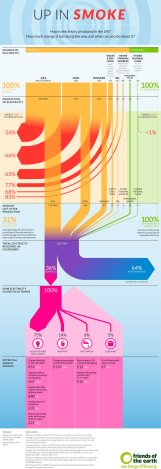
London, during the coal-caused “Great Smog” of 1952. (Photo courtesy of Geograph.)
Germany just set a new record in solar energy production, creating 14.7 terawatt-hours of electricity over the first six months of 2012. Solar energy covered between 10 and 50 percent of the country’s peak hour demand on average every day. Nice work, Germany!
Meanwhile, elsewhere in Europe (and also in Germany):
Demand for coal, the dirtiest fuel for making electricity, grew 3.3 percent last year in Europe while sales of less-polluting natural gas fell 2.1 percent, the steepest drop since 2009, according to a BP Plc report.
Oh man, Europe, what happened? We thought you were cool.
But even with some European Union member nations implementing efforts to increase the cost of carbon pollution, coal is still less expensive than the alternatives. And Europe has its enablers:
Cheaper coal was made possible partly by a 49 percent jump in first-quarter imports from the U.S., Energy Information Administration data show.
The fracking boom in the U.S. has led to a big drop in coal use, meaning that we’re now free to export that coal to Europe.
Ha ha. Um, sorry, guys.
Friends of the Earth took a look at the efficiency of energy production of various types in the United Kingdom. Of all of the thermal energy created by coal power, a solid two-thirds of it is lost in the production process.

Click to embiggen. (Image courtesy of The Guardian.)
Solar production, on the other hand, barely wastes a watt.*
Coal is so cheap that even wasting two-thirds of its energy, adding additional fees, and having to schlep it across the Atlantic Ocean makes it economically worthwhile for European nations. The free market is a tough game to win when your only advantage is being right.
* Update: As Sean Casten notes, our original formulation that solar “doesn’t waste a watt” is giving the technology too much credit.




